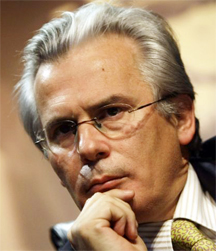MADRID, (Reuters) – Spain’s Supreme Court disbarred crusading Judge Baltasar Garzon for 11 years yesterday for illegally recording defence lawyers’ conversations with clients, which may effectively end his career in international human rights trials.

Although less severe than a 17-year ban the prosecution had originally demanded, the court said the ruling was not subject to appeal. Garzon, 56, is also liable to a fine of 2,500 euros ($3,300).
“We shall carry on fighting, carry on appealing. We have a long road ahead, but I believe both he and I are more than strong enough,” Garzon’s lawyer Javier Baena said after the sentence.
The judge was accused of authorising police to record conversations between defence lawyers and their clients in a corruption case.
Garzon is on trial in two more cases, one for allegedly abusing his authority by ordering an inquiry into the murder and forced disappearance of more than 100,000 people by forces loyal to late dictator Francisco Franco.
Garzon is charged in that case with violating a 1977 amnesty law. The judge maintains he acted at the request of the families of victims and that international law backs him.
The International Commission of Jurists in Geneva condemned Garzon’s conviction.
“The context of this conviction is very worrying. Three proceedings have been opened against a judge who lifted the veil of amnesty protecting alleged crimes against humanity that have yet to be investigated,” ICJ President Pedro Nikken said in a statement.
“One might wonder to what extent this sentence is just a way to silence Garzon.”
